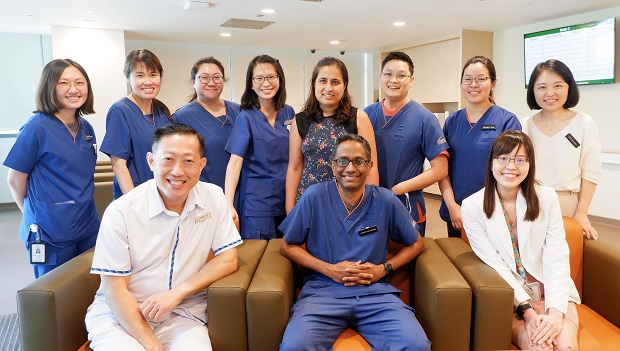Geriatric patients are diverse, with varying lifestyles, socioeconomic backgrounds, levels of social support, and multiple co-morbidities. When treating this group for cancer, an accurate patient profile is needed to determine the best course of treatment.
Geriatric Oncology (GO) is the specialised field that focuses on the needs of older adults with cancer that takes into account the patient’s health status as a whole.
Professor Ravindran Kanesvaran, Chairman, Division of Medical Oncology, National Cancer Centre Singapore (NCCS), was first introduced to GO in 2008 by a colleague, Dr Donald Poon, who started the first GO programme at the NCCS in 2007. “The idea that elderly patients with cancer should be treated based on factors such as their physical and social condition that are specific to their stage of life interested me,” he said.
A young registrar at the time, Prof Ravindran had been considering specialising in gastroenterology, but made the switch to oncology after his mother was diagnosed with breast cancer and his family experienced the anxiety and impact of a cancer diagnosis first-hand. “I experienced how difficult it is for a patient and their family to navigate a cancer journey. That was what motivated me to pursue medical oncology,” he said.
Prof Ravindran observed that family members may sometimes request treatment to prolong the patient’s life though this may not align with what the patient wants: “Sometimes, the patient does not wish to live longer, but instead wishes to minimise pain or suffering and focus on quality of life.” Conversely, there may be patients who are fit and keen to undergo more radical treatments but are not given such options because of assumptions about their fitness based only on their age. Elderly patients with cancer are often assumed to be too frail to tolerate radical treatments and to prefer comfort care. This bias denies fitter elderly patients from receiving the right treatment.
Prof Ravindran shared the case of a very fit 94-year-old patient who was on conservative cancer management but was, in fact, a good candidate for a more aggressive treatment plan that would be potentially curative and is typically offered to younger patients. “The aim of geriatric oncology is to personalise treatment for older adults and remove ageism. Treatment for an elderly patient should be evaluated based on who the patient is — their fitness level, mental state, and functional level — and not just their age,” he explained.
Prof Ravindran is supported by a team comprising medical oncologists, geriatricians, rehabilitation physicians, nurses, medical social workers, occupational therapists, pharmacists, and physiotherapists. “As part of the GO treatment process at NCCS, cancer patients over the age of 70 years undergo a comprehensive geriatric assessment,” he shared.

<<The GO team comprises medical oncologists, geriatricians, rehabilitation physicians, nurses, medical social workers, occupational therapists, pharmacists, and physiotherapists.>>
This involves an assessment of their physical state for common elderly conditions such as prostate, bladder and kidney disease; and their mental state, dementia or memory issues. It also considers their social state, such as whether they are experiencing social isolation. It also looks at chemotherapy toxicity, fitness, and ability to tolerate medication. This holistic assessment helps clinicians decide whether to reduce the medication or chemotherapy dosage for the patient without adversely impacting their health. Upon completion of the assessment, patients are categorised into groups based on their level of fitness and vulnerability. Standard-of-care treatment is recommended for fit patients, while frail patients are recommended to avoid treatment that would worsen their quality of life.
A recent study showed that patients who had undergone these GO assessments experienced a better quality of life, fewer hospital admissions, and lower medication dosage than those who had not undergone the assessments.
The GO programme received a much-needed boost on 1 December 2023, when Prof Ravindran was conferred the Distinguished Professorship in Geriatric Oncology in the SingHealth Duke-NUS Oncology Academic Clinical Programme (ONCO ACP). Established with a gift of $2.5 million from donor Mr Kuok Khoon Hong, Chairman and CEO, Wilmar International, the professorship aims to drive transformative GO research and educational programmes that will optimise treatment for older adults with cancer, as well as boost the ONCO ACP’s efforts to support long-term research and advancements to address the challenges of cancer and ageing.
“I hope to utilise the funding to expand this programme, which we currently run at no cost to patients,” said Prof Ravindran. “The assessments bring hope and encourage fitter, older patients to proceed with more radical treatments that can potentially help cure the cancer, and not recommend these therapies that often come with severe side effects to patients who have lower tolerance or fitness.”
Get the latest updates about Singapore Health in your mailbox! Click here to subscribe.
Read more: How does chemotherapy affect seniors and can good nutrition aid recovery? Click here to find out.
